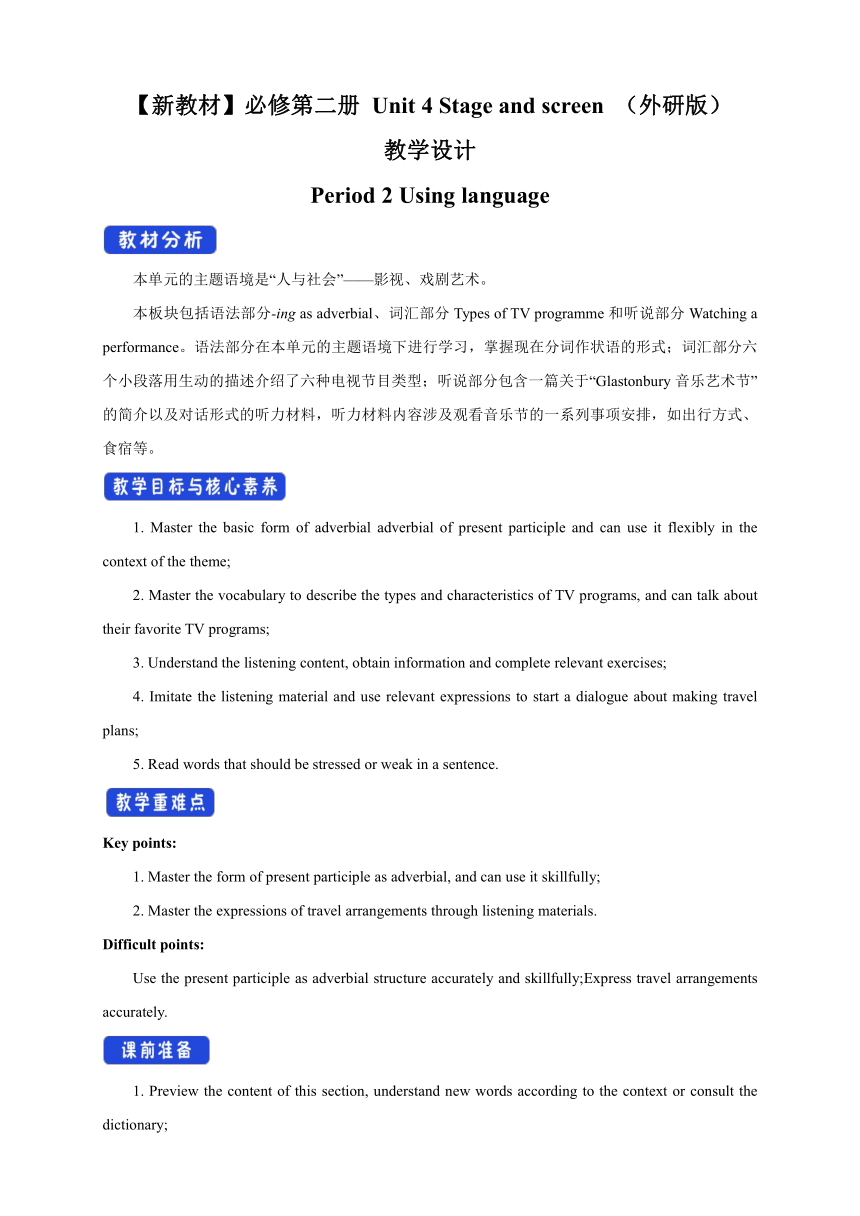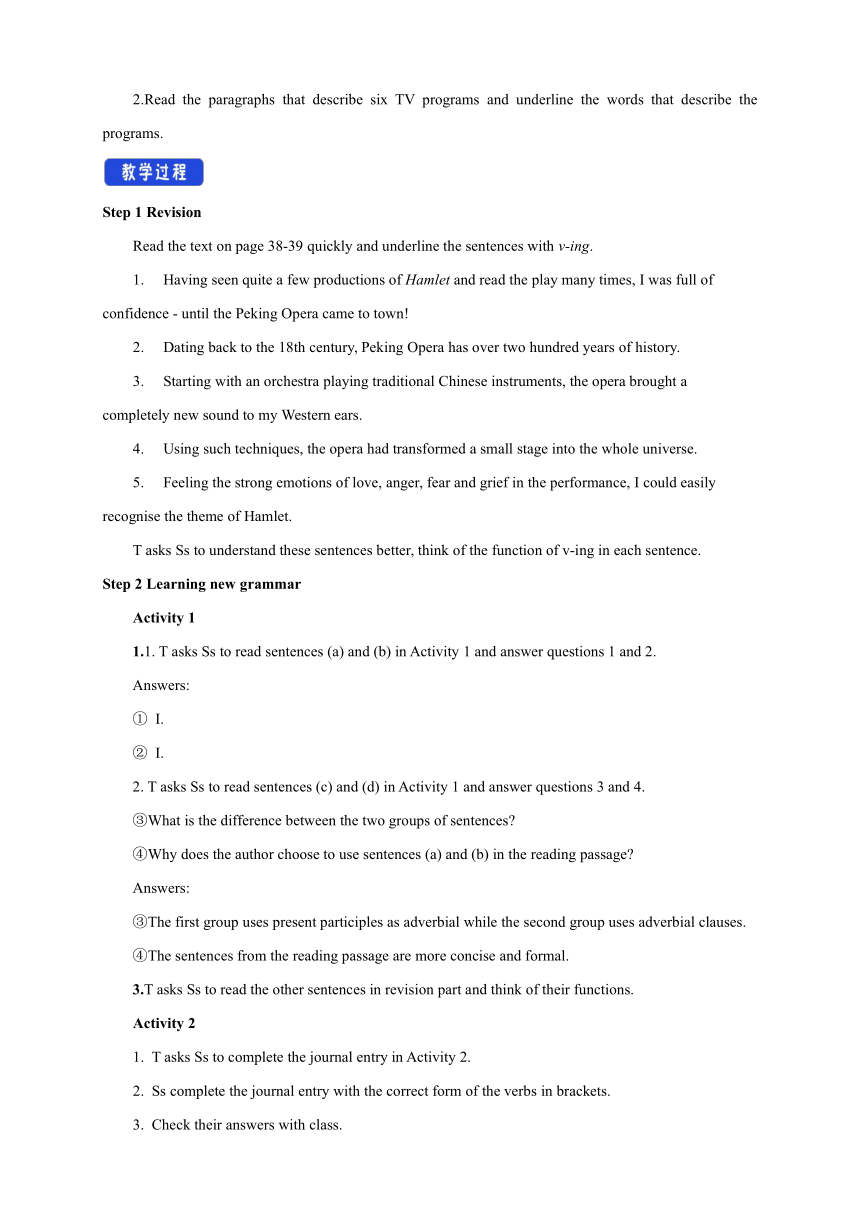外研版(2019)必修第二册 Unit4 Stage and screen Using languages 教学设计(1)
文档属性
| 名称 | 外研版(2019)必修第二册 Unit4 Stage and screen Using languages 教学设计(1) |  | |
| 格式 | zip | ||
| 文件大小 | 51.3KB | ||
| 资源类型 | 教案 | ||
| 版本资源 | 外研版(2019) | ||
| 科目 | 英语 | ||
| 更新时间 | 2022-08-21 16:26:36 | ||
图片预览


文档简介
【新教材】必修第二册 Unit 4 Stage and screen (外研版)
教学设计
Period 2 Using language
本单元的主题语境是“人与社会”——影视、戏剧艺术。
本板块包括语法部分-ing as adverbial、词汇部分Types of TV programme和听说部分Watching a performance。语法部分在本单元的主题语境下进行学习,掌握现在分词作状语的形式;词汇部分六个小段落用生动的描述介绍了六种电视节目类型;听说部分包含一篇关于“Glastonbury音乐艺术节”的简介以及对话形式的听力材料,听力材料内容涉及观看音乐节的一系列事项安排,如出行方式、食宿等。
1. Master the basic form of adverbial adverbial of present participle and can use it flexibly in the context of the theme;
2. Master the vocabulary to describe the types and characteristics of TV programs, and can talk about their favorite TV programs;
3. Understand the listening content, obtain information and complete relevant exercises;
4. Imitate the listening material and use relevant expressions to start a dialogue about making travel plans;
5. Read words that should be stressed or weak in a sentence.
Key points:
1. Master the form of present participle as adverbial, and can use it skillfully;
2. Master the expressions of travel arrangements through listening materials.
Difficult points:
Use the present participle as adverbial structure accurately and skillfully;Express travel arrangements accurately.
1. Preview the content of this section, understand new words according to the context or consult the dictionary;
2.Read the paragraphs that describe six TV programs and underline the words that describe the programs.
Step 1 Revision
Read the text on page 38-39 quickly and underline the sentences with v-ing.
Having seen quite a few productions of Hamlet and read the play many times, I was full of confidence - until the Peking Opera came to town!
Dating back to the 18th century, Peking Opera has over two hundred years of history.
Starting with an orchestra playing traditional Chinese instruments, the opera brought a completely new sound to my Western ears.
Using such techniques, the opera had transformed a small stage into the whole universe.
Feeling the strong emotions of love, anger, fear and grief in the performance, I could easily recognise the theme of Hamlet.
T asks Ss to understand these sentences better, think of the function of v-ing in each sentence.
Step 2 Learning new grammar
Activity 1
1.1. T asks Ss to read sentences (a) and (b) in Activity 1 and answer questions 1 and 2.
Answers:
① I.
② I.
2. T asks Ss to read sentences (c) and (d) in Activity 1 and answer questions 3 and 4.
③What is the difference between the two groups of sentences
④Why does the author choose to use sentences (a) and (b) in the reading passage
Answers:
③The first group uses present participles as adverbial while the second group uses adverbial clauses.
④The sentences from the reading passage are more concise and formal.
3.T asks Ss to read the other sentences in revision part and think of their functions.
Activity 2
T asks Ss to complete the journal entry in Activity 2.
Ss complete the journal entry with the correct form of the verbs in brackets.
Check their answers with class.
Answers: 1.Seeing 2.felt 3.making 4.to practise 5.Feeling 6.knowing
Step 3 Practice
Activity 3
1. T asks Ss to rewrite the paragraph using the -ing form in Activity 3.
2. Ss rewrite the paragraph using the -ing form in Activity 3.
3. Check the answers with class.
Answers:
I went to watch the ballet The Peony Pavilion last night. Having thought ballet was more or less the same everywhere, I was totally unprepared for its unique beauty. As soon as the curtain rose, I was absorbed. Borrowing a lot from Chinese dance and music, the Eastern influence on the ballet was clear. The production was full of colours and romantic symbols, challenging my senses in new ways. Enjoying it so much, I have changed my opinion about ballet. I can't wait to go again!
Step 4 Reading and answering
Activity 4
1. T asks Ss to look at the pictures and answer the questions.
①What do you know about these types of TV programme
②Can you think of some examples of each type
2. Ss talk about what they know about these types of TV programme.
Activity 5
1. T asks Ss to read the descriptions in Activity 5, match them to the types of TV programme in Activity 4, and underline the words and expressions describing them.
2. Check the answers with class.(1-c, 2-e, 3-d, 4-a, 5-b, 6-f)
Step 5 Practice
Activity 6
T asks Ss to talk about their favourite TV programme using the words and expressions they have learnt.
T asks Ss to read the short passage in “Did You Know ” to get some basic information about Glastonbury Festival.
Step 6 Listening
Activity 7
1. T plays the recording for the first time and asks Ss to finish Activity 7.
2. Ss listen for the first time to get some key information about the arrangements.
Activity 8
1. 1. T plays the recording again for Ss to complete the flyer in Activity 8.
2. T asks Ss to talk about how Josh makes arrangements by referring to the memo and the flyer.
3. T asks Ss to summarise basic elements involved when making arrangements.
Step 7 Speaking
Activity 9
1. T asks Ss to listen to the interview and choose the points mentioned.
2. T asks Ss to listen again and complete the journalist’s notes.
3. T asks Ss to listen for the third time and talks about the explanations Leah gives for doing Tai Chi.
4. Listen again and then check answers with class.
Step 8 Homework
T asks Ss to make similar arrangements to attend a concert in another city.
Remember the functions of v-ing.
Complete the exercises in learning plan.
1.通过本节内容学习,学生能否掌握现在分词的功能和用法;
2.通过本节内容学习,学生能否掌握描述电视节目类型以及特点的词汇,能否谈论自己喜爱的电视节目。
教学设计
Period 2 Using language
本单元的主题语境是“人与社会”——影视、戏剧艺术。
本板块包括语法部分-ing as adverbial、词汇部分Types of TV programme和听说部分Watching a performance。语法部分在本单元的主题语境下进行学习,掌握现在分词作状语的形式;词汇部分六个小段落用生动的描述介绍了六种电视节目类型;听说部分包含一篇关于“Glastonbury音乐艺术节”的简介以及对话形式的听力材料,听力材料内容涉及观看音乐节的一系列事项安排,如出行方式、食宿等。
1. Master the basic form of adverbial adverbial of present participle and can use it flexibly in the context of the theme;
2. Master the vocabulary to describe the types and characteristics of TV programs, and can talk about their favorite TV programs;
3. Understand the listening content, obtain information and complete relevant exercises;
4. Imitate the listening material and use relevant expressions to start a dialogue about making travel plans;
5. Read words that should be stressed or weak in a sentence.
Key points:
1. Master the form of present participle as adverbial, and can use it skillfully;
2. Master the expressions of travel arrangements through listening materials.
Difficult points:
Use the present participle as adverbial structure accurately and skillfully;Express travel arrangements accurately.
1. Preview the content of this section, understand new words according to the context or consult the dictionary;
2.Read the paragraphs that describe six TV programs and underline the words that describe the programs.
Step 1 Revision
Read the text on page 38-39 quickly and underline the sentences with v-ing.
Having seen quite a few productions of Hamlet and read the play many times, I was full of confidence - until the Peking Opera came to town!
Dating back to the 18th century, Peking Opera has over two hundred years of history.
Starting with an orchestra playing traditional Chinese instruments, the opera brought a completely new sound to my Western ears.
Using such techniques, the opera had transformed a small stage into the whole universe.
Feeling the strong emotions of love, anger, fear and grief in the performance, I could easily recognise the theme of Hamlet.
T asks Ss to understand these sentences better, think of the function of v-ing in each sentence.
Step 2 Learning new grammar
Activity 1
1.1. T asks Ss to read sentences (a) and (b) in Activity 1 and answer questions 1 and 2.
Answers:
① I.
② I.
2. T asks Ss to read sentences (c) and (d) in Activity 1 and answer questions 3 and 4.
③What is the difference between the two groups of sentences
④Why does the author choose to use sentences (a) and (b) in the reading passage
Answers:
③The first group uses present participles as adverbial while the second group uses adverbial clauses.
④The sentences from the reading passage are more concise and formal.
3.T asks Ss to read the other sentences in revision part and think of their functions.
Activity 2
T asks Ss to complete the journal entry in Activity 2.
Ss complete the journal entry with the correct form of the verbs in brackets.
Check their answers with class.
Answers: 1.Seeing 2.felt 3.making 4.to practise 5.Feeling 6.knowing
Step 3 Practice
Activity 3
1. T asks Ss to rewrite the paragraph using the -ing form in Activity 3.
2. Ss rewrite the paragraph using the -ing form in Activity 3.
3. Check the answers with class.
Answers:
I went to watch the ballet The Peony Pavilion last night. Having thought ballet was more or less the same everywhere, I was totally unprepared for its unique beauty. As soon as the curtain rose, I was absorbed. Borrowing a lot from Chinese dance and music, the Eastern influence on the ballet was clear. The production was full of colours and romantic symbols, challenging my senses in new ways. Enjoying it so much, I have changed my opinion about ballet. I can't wait to go again!
Step 4 Reading and answering
Activity 4
1. T asks Ss to look at the pictures and answer the questions.
①What do you know about these types of TV programme
②Can you think of some examples of each type
2. Ss talk about what they know about these types of TV programme.
Activity 5
1. T asks Ss to read the descriptions in Activity 5, match them to the types of TV programme in Activity 4, and underline the words and expressions describing them.
2. Check the answers with class.(1-c, 2-e, 3-d, 4-a, 5-b, 6-f)
Step 5 Practice
Activity 6
T asks Ss to talk about their favourite TV programme using the words and expressions they have learnt.
T asks Ss to read the short passage in “Did You Know ” to get some basic information about Glastonbury Festival.
Step 6 Listening
Activity 7
1. T plays the recording for the first time and asks Ss to finish Activity 7.
2. Ss listen for the first time to get some key information about the arrangements.
Activity 8
1. 1. T plays the recording again for Ss to complete the flyer in Activity 8.
2. T asks Ss to talk about how Josh makes arrangements by referring to the memo and the flyer.
3. T asks Ss to summarise basic elements involved when making arrangements.
Step 7 Speaking
Activity 9
1. T asks Ss to listen to the interview and choose the points mentioned.
2. T asks Ss to listen again and complete the journalist’s notes.
3. T asks Ss to listen for the third time and talks about the explanations Leah gives for doing Tai Chi.
4. Listen again and then check answers with class.
Step 8 Homework
T asks Ss to make similar arrangements to attend a concert in another city.
Remember the functions of v-ing.
Complete the exercises in learning plan.
1.通过本节内容学习,学生能否掌握现在分词的功能和用法;
2.通过本节内容学习,学生能否掌握描述电视节目类型以及特点的词汇,能否谈论自己喜爱的电视节目。
